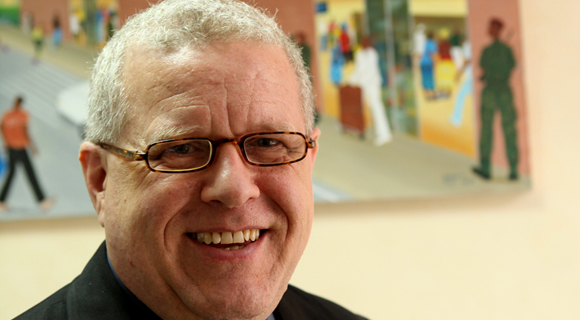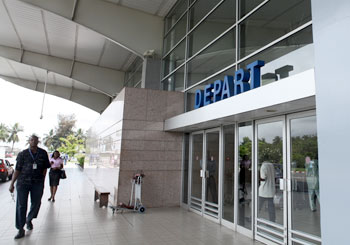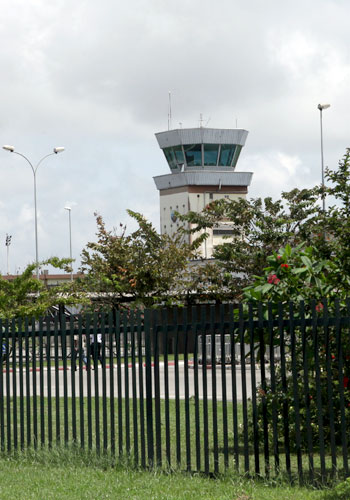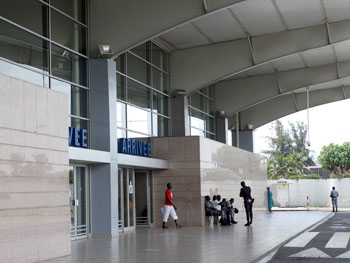The International Airport of Abidjan
Thierry Vandenkerckhove, Chief Executive Officer of Aeria (Aéroport international Félix Houphouët Boigny d’Abidjan)
The International Airport of Abidjan was designed to handle 2 million travellers per year. Mr. Vandenkerchove forecasts that the 1 million milestone should be again reached after 2012. Then, the International Airport of Abidjan will have a steady growth of 5-10% in the years to come.
Interview with Thierry Vandenkerckhove, Chief Executive Officer of Aeria (Aéroport international Félix Houphouët Boigny d’Abidjan)

In the aftermath of the post-electoral crisis, how would you assess the general environment of the aviation sector in the Côte d’Ivoire?
We have an airport that was built to handle a traffic of two million passengers per year, but we have never reached that figure. The best times we had were before the bankruptcy of Aeria fleet, before 9/11, and before the troubled period in the country when we reached more than one million passengers per year.
After the crisis, we have had a very difficult period and by the end of this year, we will reach—if everything is alright—600,000 passengers for the year. We think that after 2012, we will get back to the one million mark and then we will have a steady growth of 5-10% and further important growth in the years to come.

Aeria just won a concession of 20 years to operate the airport in 2010. That gives you an important role in the economic development of the country. You also promised to make significant investment to improve infrastructure of the Abidjan airport. What are some of the projects that you are going to carry out and what are some of the difficulties associated with these projects?
This is actually the second period of concession. We had a first concession period of 15 years, which started in 1996 and accounted for an investment of 25 billion CFA francs. We are now in the second concession period of 20 years, in which we plan on investing on our own an amount of 80 billion CFA francs to cover a wide range of projects.
The main one is refurbishing the terminal, making sure that all the equipments of the terminal are fit for the two million passenger mark, and enable the passengers to have a very good experience through our airport.
Other than the terminal itself, we will create an infrastructure to cope with charter flights and low-cost airlines. We will have new development as well for different hangars and for the freight terminal; with work starting on a new freight terminal early next year.
We will also finalize the plans for a training academy for all airport personnel including meteorology, security, etc. These are some of the projects that will be completed in the next couple of years.
It is also important to mention the other projects in the surrounding areas of the airport, which could be a very lucrative investment opportunity for an international investor.
Even throughout the crisis, the airport was always protected by the UN, the Ivorian military, and the French force legion, so the airport was and will always be the safest place.
As part of our obligation for the new concession, in addition to our core business of airport operation, we also have the responsibility to develop over 3,700 hectares in the surrounding area of the airport to really make it a business center for the region and to develop all the hotel, trade, residential, and urban activities and create an airport city. It’s called Port Bouet ville aéroportuaire.
Since this is not your core business, what kind of expertise are you going to utilize and what are the challenges associated with it?
Aeria has a technical partner, the Aegis Group, which is a subsidiary of French and has a very wide range of competences including urban development, building trade areas, and developing airport cities. So we will connect with different companies in that group and seek for the competencies to develop and manage this new project.
How are you going to attract new airlines to establish their presence in the airport?
A lot of airlines have discontinued service to the Ivory Coast because of the crisis that was prevailing for the last ten years. In fact, the development of surrounding airports like Dakar and Accra was due also to the fact that the Côte d’Ivoire was in very bad shape. Now we have a new prospect for development that is huge.

The government is attracting new investors, new partners, and is really opening the country to the world. It is our role to make sure that the infrastructure is there to welcome and accommodate all this increased traffic. Some airlines have discontinued their operations during the crisis such as South African Airways or Egypt Air or other companies. We are in contact with them, and they are now planning on returning to the Côte d’Ivoire.
There are also some very interesting developments in tourism and promotion of trade visits with the possibility of issuing visas upon arrival. All these factors will increase traffic and increase visibility of the country, so we are ready for that and we will make sure the airport is ready as well.
You are in contact with a lot of external players; what is their major concern when they consult with you and what is your response to it?
The major concern right now is security. This is actually an advantage for us because we plan on building an airport city right around the airport so people will not have to travel much further inland and they will have everything right at the airport.
We are also taking all the steps to increase security. We have an airport that is really up to the international standards and we have a new company that is dealing with all aspects of airport security and is bringing us to the right level foreseen by ICAO. Regarding general security, things are on track; the military is back in their barracks and the civilian administration is managing the streets.
The country has improved dramatically in the last 2-3 months and we have to tell all the potential investors and travelers to the Côte d’Ivoire that the country is now safe and that all the measures are taken to make travel safe at the airport.

Would you also be able to protect travelers against external factors if things go wrong?
Even throughout the crisis, the airport was always protected by the UN, the Ivorian military, and the French force legion, so the airport was and will always be the safest place.
What is the investment surrounding the airport going to look like? Are there going to be free zones for industry just like Dubai that could serve the region?
There are many plans and our Ministry of Economic Infrastructure has a vision for the airport, which encompasses free trade zones, links between the ports and the airport, and a railway system so that we will really have a multi-modal system developing here.